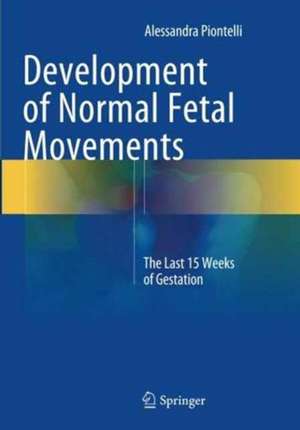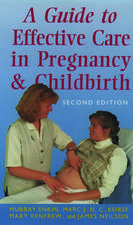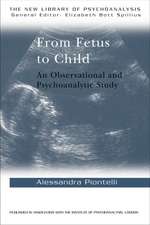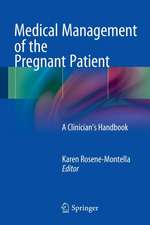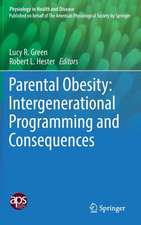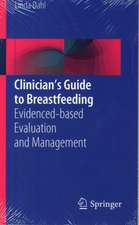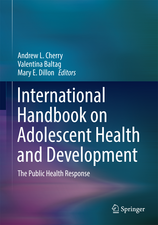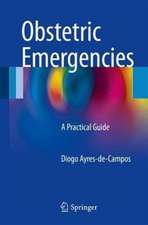Development of Normal Fetal Movements: The Last 15 Weeks of Gestation
Autor Alessandra Piontellien Limba Engleză Paperback – noi 2016
| Toate formatele și edițiile | Preț | Express |
|---|---|---|
| Paperback (2) | 702.35 lei 38-44 zile | |
| Springer – 13 dec 2014 | 702.35 lei 38-44 zile | |
| Springer – noi 2016 | 762.44 lei 38-44 zile | |
| Hardback (2) | 668.37 lei 38-44 zile | |
| Springer – 21 iun 2010 | 668.37 lei 38-44 zile | |
| Springer – 27 mar 2015 | 719.02 lei 6-8 săpt. |
Preț: 762.44 lei
Preț vechi: 802.57 lei
-5% Nou
Puncte Express: 1144
Preț estimativ în valută:
145.91€ • 150.53$ • 123.49£
145.91€ • 150.53$ • 123.49£
Carte tipărită la comandă
Livrare economică 28 februarie-06 martie
Preluare comenzi: 021 569.72.76
Specificații
ISBN-13: 9788847039322
ISBN-10: 8847039320
Pagini: 156
Ilustrații: XI, 145 p. 67 illus., 16 illus. in color.
Dimensiuni: 178 x 254 mm
Ediția:Softcover reprint of the original 1st ed. 2015
Editura: Springer
Colecția Springer
Locul publicării:Milano, Italy
ISBN-10: 8847039320
Pagini: 156
Ilustrații: XI, 145 p. 67 illus., 16 illus. in color.
Dimensiuni: 178 x 254 mm
Ediția:Softcover reprint of the original 1st ed. 2015
Editura: Springer
Colecția Springer
Locul publicării:Milano, Italy
Cuprins
Introduction.- General Movements.- Localized or Isolated Movements.- Fetal Breathing Movements and Shallow Fetal Breathing Movements.- Swallowing, Sucking, and Mouthing.- Startles, Twitches and Cloni.- Seemingly trivial fetal motions: Yawning and Hiccups.- Fetuses: Facial Motions or Facial Expressions?.- Fetal Behavioral States.- Twin Fetuses: Facts and Late-Pregnancy Twin Myths.- Fetal Sensory Abilities.- Conclusions.- Index.
Notă biografică
After graduating in Medicine and Surgery at the University of Milan, Italy, Alessandra Piontelli qualified as a specialist in Neurology and Psychiatry at the University of Parma. For more than a decade she worked at the Tavistock Clinic, London, where her responsibilities included teaching child neurology and psychiatry. In 1983 she was appointed Visiting Professor by the Department of Child Neurology and Psychiatry, University of Milan. Since 1990 she has worked at the First Department of Obstetrics and Gynaecology, University of Milan, where she is involved in research into fetal and neonatal behavior and physiology and maternal behavior during pregnancy and the early post-partum period. In 2007 she was Visiting Professor at the University of Stellenbosch, South Africa and, in 2011, Visiting Professor and Master in Pre-Natal and Peri-Natal Education at the University of Valencia, Spain. Her previous books include Backwards in Time: a Study in Infant Observation (Karnac Books, 1986), From Fetus to Child (Routledge, 1992), Twins: From Fetus to Child (Routledge, 2002), and Twins in the World (McMillan-Palgrave, 2008).
Textul de pe ultima copertă
In the later stages of gestation, fetal functions undergo increasing change and development, preparing the fetus for the transition to its postnatal environment. Rapid maturation is witnessed in breathing, swallowing, sensory functions, sleep, and many other processes, with corresponding behavioral changes. By 35 to 40 weeks of gestation, fetuses are capable of living ex utero without support, but it is increasingly appreciated that even infants born at between 35 and 36 weeks can suffer long-term consequences. This book, which complements the author’s previous volume on development of normal fetal movements during the first 25 weeks of gestation, discusses in detail the full range of behavioral phenomena observed during the final 15 weeks of gestation, with careful analysis of their mutual relationships. A key feature is the outstanding photographic material, difficult to obtain at this late stage, and the instructive graphs that are also included. The information provided will alert clinicians to deviations from the norm and to physiologic phenomena that can turn pathologic in infants born prematurely.
Caracteristici
Up-to-date and comprehensive description of the full range of behavioral phenomena observed during the final 15 weeks of gestation Outstanding photographic material Written by an author specialized in neurology, obstetrics, psychiatry, and infant-child development?
